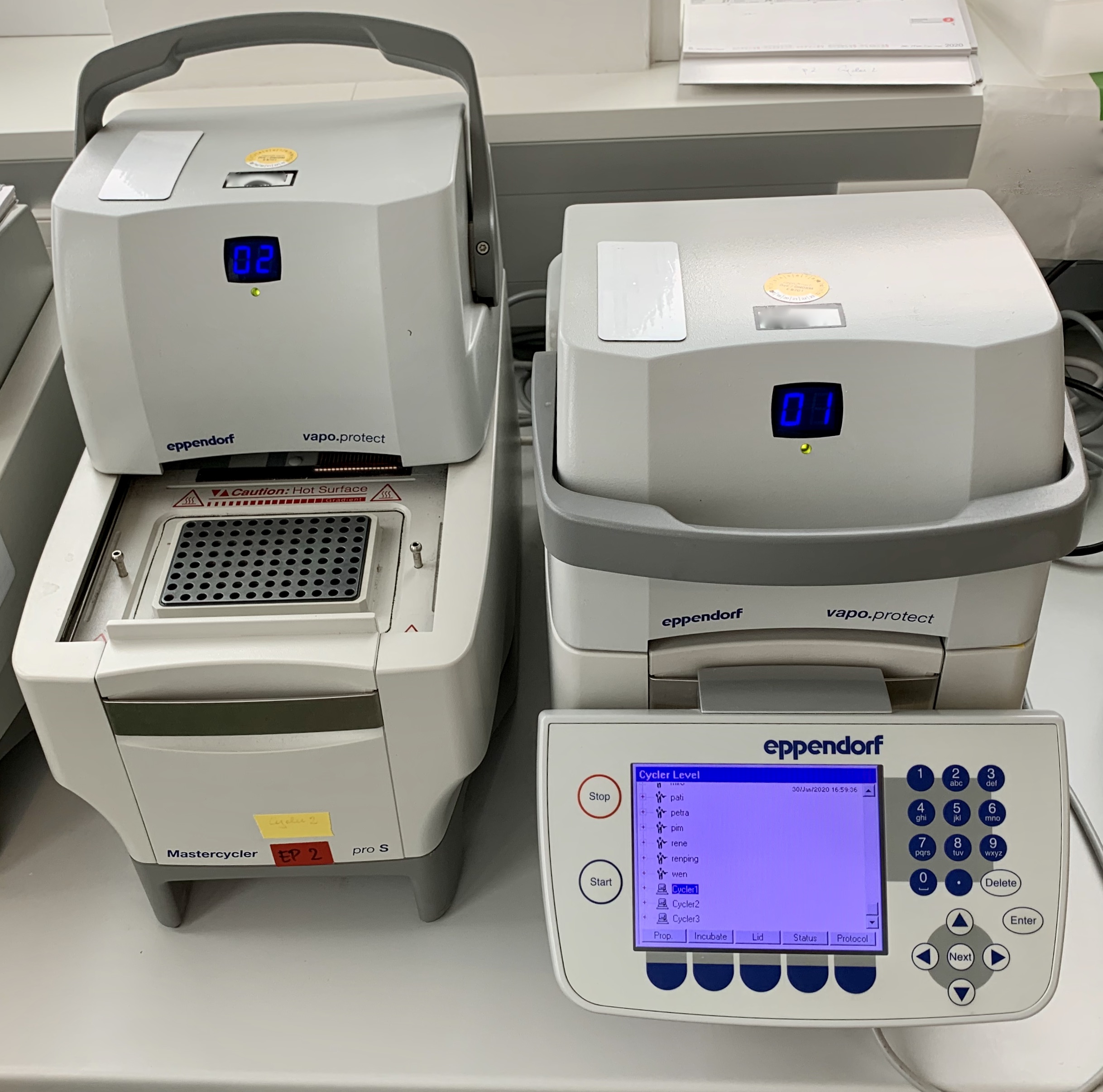User:Shawndouglas/sandbox/sublevel36
3. Adding COVID-19 and other virus testing to your laboratory
3.1 Prepping based on methodology
In the previous chapter, the most common testing methodologies for COVID-19 and other coronaviruses was discussed in detail. The prevailing method (often called the "gold standard") among them all was real-time reverse-transcription polymerase chain reaction (rRT-PCR) assays for testing. Broadly speaking, PCR is useful in pharmaceutical, biotechnology, and genetic engineering endeavors, as well as clinical diagnostics. As such, labs in those industries that already have PCR ifrastructure in place have a theoretical step-up over a lab that doesn't.
PCR technology has advanced to the point where it is more efficient and user-friendly than prior, yet "the high cost of the instruments, servicing contracts, and reagents pose major challenges for the market, especially to the price-sensitive academics."[1] Amidst the pandemic, however, additional challenges also exist to those wanting to conduct PCR testing for COVID-19 and other viruses. As was discussed at the end of the previous chapter, supplies of reagents and consumables are not particularly robust mid-pandemic, with shortages being reported since March 2020.[2][3][4][5][6][7][8][9][10] These shortages may eventually work themselves out, but they highlight the need for other varying methods that don't necessarily depend on the same reagents and consumables that are in short supply.
The explosion of new coronavirus tests that could help to end the pandemic https://www.nature.com/articles/d41586-020-02140-8
Methods for speeding up PCR (and alternatives such as LAMP and CRISPR):
- Journal:Fast SARS-CoV-2 detection by RT-qPCR in preheated nasopharyngeal swab samples
- https://news.vanderbilt.edu/2020/07/29/streamlined-diagnostic-approach-to-covid-19-can-avoid-potential-testing-logjam/
- https://www.techexplorist.com/improving-speed-gold-standard-covid-19-diagnostic-test/34069/
- https://www.sciencemag.org/news/2020/08/radical-shift-testing-strategy-needed-reopen-schools-and-businesses-researchers-say
- https://asiatimes.com/2020/08/pooled-virus-tests-help-stretched-health-services/
- https://www.healthline.com/health-news/how-pooled-testing-can-help-us-fight-spread-of-covid-19
- https://onlinelibrary.wiley.com/doi/full/10.1002/jmv.26328
- https://www.fiercebiotech.com/medtech/oxford-researchers-develop-portable-covid-19-test-costing-less-than-25
- [9]
- [10]
Alternative testing:
- https://thejewishvoice.com/2020/08/10-ways-israeli-scientists-are-improving-corona-testing-part-1/
- https://www.nation.co.ke/kenya/news/scientists-develop-covid-19-rapid-test-kit-1912962
Alternative reagents:
POLs:
- https://hitconsultant.net/2020/08/03/talis-nih-contract-for-point-of-care-covid-19-testing/
- https://www.nih.gov/news-events/news-releases/nih-delivering-new-covid-19-testing-technologies-meet-us-demand
3.2 The equipment
Instruments
Thermal cyclers (a.k.a. PCR machines) - standard PCR systems, RT PCR - advantages of digital PCR systems such as precision, sensitivity, accuracy, reproducibility, direct quantification and multiplexing, and speed of the analysis systems, and digital PCR systems "The market is witnessing an emerging trend of digital and droplet digital PCR technology, which is sensitive and accurate than the traditional method."
https://www.thermofisher.com/search/browse/category/us/en/602552/PCR+Machines+%28Thermal+Cyclers%29+%26+Accessories https://blog.biomeme.com/how-do-you-test-for-covid-19
Reagents
template DNA, PCR primers and probes, dNTPs, PCR buffers, enzymes, and master mixes
Consumables
PCR tubes, plates, and other accessories https://www.sigmaaldrich.com/labware/labware-products.html?TablePage=9577275
Software and services
3.3 The vendors
Major players operating in the global PCR market are Bio-Rad Laboratories, Inc., QIAGEN N.V., F. Hoffmann-La Roche AG, Thermo Fisher Scientific, Inc. Becton, Dickinson and Company, Abbott, Siemens Healthcare GmbH (Siemens AG), bioMérieux SA, Danaher Corporation, and Agilent Technologies. Merck KGaA, Promega
References
- ↑ Kenneth Research (23 June 2020). "Polymerase Chain Reaction Market Sector Analysis Report, Regional Outlook & Competitive Share & Forecast - 2023". MarketWatch. https://www.marketwatch.com/press-release/polymerase-chain-reaction-market-sector-analysis-report-regional-outlook-competitive-share-forecast---2023-2020-06-23. Retrieved 06 August 2020.
- ↑ Herper, M.; Branswell, H. (10 March 2020). "Shortage of crucial chemicals creates new obstacle to U.S. coronavirus testing". STAT. https://www.statnews.com/2020/03/10/shortage-crucial-chemicals-us-coronavirus-testing/. Retrieved 10 April 2020.
- ↑ Hale, C. (18 March 2020). "Qiagen aims to more than quadruple its COVID-19 reagent production in 6 weeks". Fierce Biotech. https://www.fiercebiotech.com/medtech/qiagen-aims-to-more-than-quadruple-its-covid-19-reagent-production-6-weeks. Retrieved 10 April 2020.
- ↑ Mehta, A. (3 April 2020). "Mystery surrounds UK claim of Covid-19 test reagent ‘shortage’". Chemistry World. https://www.chemistryworld.com/mystery-surrounds-uk-claim-of-covid-19-test-reagent-shortage/4011457.article. Retrieved 10 April 2020.
- ↑ Roche, B. (8 April 2020). "Irish scientists develop reagent in effort to ease Covid-19 testing delays". The Irish Times. https://www.irishtimes.com/news/science/irish-scientists-develop-reagent-in-effort-to-ease-covid-19-testing-delays-1.4223897. Retrieved 10 April 2020.
- ↑ Padma, T.V. (13 May 2020). "Efforts to combat Covid-19 in India hit by imported reagent shortages". Chemistry World. https://www.chemistryworld.com/news/efforts-to-combat-covid-19-in-india-hit-by-imported-reagent-shortages/4011718.article#/. Retrieved 19 May 2020.
- ↑ David, E.; Farber, S.E. (20 June 2020). "Survey shows resources for COVID-19 diagnostic testing still limited months later". ABC News. https://abcnews.go.com/Health/survey-shows-resources-covid-19-diagnostic-testing-limited/story?id=71341885. Retrieved 08 July 2020.
- ↑ Johnson, K. (2 July 2020). "NC Labs Facing Shortages In COVID-19 Testing Chemicals". Patch. https://patch.com/north-carolina/charlotte/nc-labs-facing-shortages-covid-19-testing-chemicals. Retrieved 08 July 2020.
- ↑ 9.0 9.1 Mervosh, S.; Fernandez, M. (4 August 2020). "‘It’s Like Having No Testing’: Coronavirus Test Results Are Still Delayed". The New York Times. https://www.nytimes.com/2020/08/04/us/virus-testing-delays.html. Retrieved 05 August 2020.
- ↑ 10.0 10.1 Courage, K.H. (31 July 2020). "Should we be testing fewer people to stop the spread of Covid-19?". Vox. https://www.vox.com/2020/7/31/21336212/covid-19-test-results-delays. Retrieved 05 August 2020.










